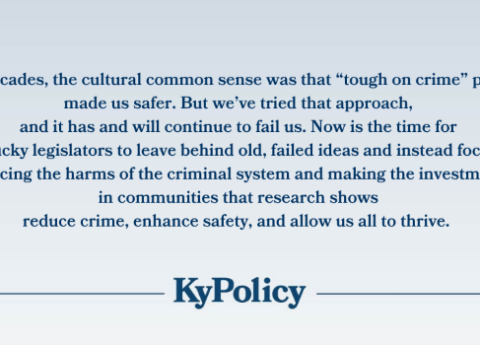It’s that time of year when national criminal justice data gets updated and Kentucky shows up on a number of “worst” lists. New data shows we are:
- 1 of 8 states that saw their highest prison population ever in 2018 (Vera Institute of Justice), while prison populations are declining across most of the U.S.
- 10th highest incarceration rate in the nation (Vera Institute of Justice).
- 2nd highest female incarceration rate in the nation (U.S. Department of Justice).
- 2nd highest in reliance on crowded local jails, which typically provide little in the way of successful reentry programs, to house people incarcerated for low-level felony convictions (U.S. Department of Justice).
A tweet from the Herald-Leader last week perhaps summed it up best: “United States: We lock up more of our people than the rest of the world; Kentucky: Hold our bourbon.” The accompanying image was a graph showing how incredibly high the incarceration rate of the U.S. is compared to other countries — and then Kentucky significantly exceeding the national incarceration rate.
Taking steps that would move the state off these “worst” lists would make a big difference in the lives of many Kentuckians, reduce racial and other disparities, and help our state budget; state spending on the Department of Corrections is expected to be nearly $600 million in 2020. Yet the 2019 General Assembly instead basically said “hold our bourbon” and passed nine bills that create new crimes, six bills that increase penalties for existing crimes and seven bills that expand existing crimes to apply to more situations — furthering the state’s current direction rather than reversing course.
While some of these new laws gained support due to the heinous nature of the offenses they deal with, increasing already-stiff penalties is not shown to be an effective way to increase public safety. In fact, as highlighted in criminal law scholar Rachel Barkow’s new book Prisoners of Politics, research shows long sentences not only don’t deter crime, but may actually decrease public safety by increasing the likelihood a person leaving prison will engage in criminal activity.
She writes: “Anyone truly interested in public safety has to pay attention to the relevant empirical facts and not simply rely on gut instinct. But all too often, legislative judgments rest on nothing more than the notion that a longer sentence will cure everything, even when the evidence shows that longer sentences often make things worse.”
And as expressed in testimony by Kentucky’s Public Advocate, if the state really needs to create these new crimes or increase penalties then we should do it as part of a broader effort to make changes to the state’s justice system that also includes reductions in penalties for some crimes.
There’s a different list Kentucky needs to strive to be on: states that are dramatically reducing the number of people incarcerated while maintaining public safety and freeing up funds for critical investments. A report from The Sentencing Project highlights five states that have been successful in doing so, with 14 to 25 percent declines in the number of people incarcerated over a decade. And they are not the states you might expect: Connecticut, Michigan, Mississippi, Rhode Island and South Carolina.
Effective policies in these states included sentencing reforms such as those that reduce penalties for drug and property crimes; probation and parole reforms so that fewer people go to prison for violations that are often technical in nature such as missing an appointment with a parole officer, and increasing access to parole.
There is a lot we can do, not just to get Kentucky off these “worst states” lists, but to have a positive impact on individuals, families and communities across the state.
This column ran in the State Journal on May 15, 2019.



